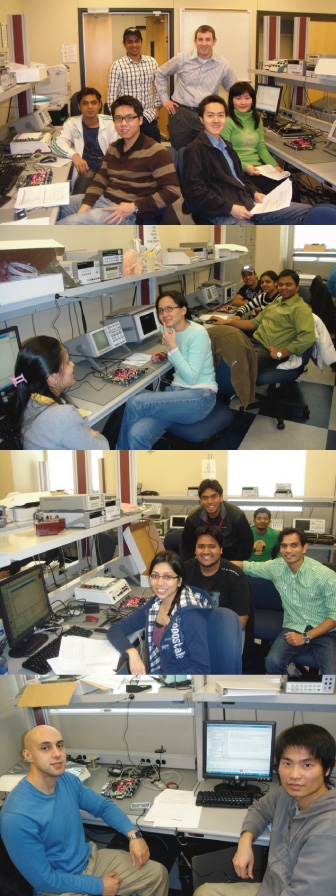 Course Webpage:
http://s2.smu.edu/~camp/courses/ee7377
Course Webpage:
http://s2.smu.edu/~camp/courses/ee7377Instructor: Professor Joseph Camp
Email: "camp" AT "smu.edu"
Phone: 214-768-8541 Fax: 214-768-3573
Office location: 340 Junkins Building, SMU campus
Office hours: MW, 9am-10:30am
 Course Webpage:
http://s2.smu.edu/~camp/courses/ee7377
Course Webpage:
http://s2.smu.edu/~camp/courses/ee7377
Instructor:
Professor Joseph Camp
Email: "camp" AT "smu.edu"
Phone: 214-768-8541 Fax: 214-768-3573
Office location: 340 Junkins Building, SMU campus
Office hours: MW, 9am-10:30am
Time/Place (in-lab lecture): 11am-12:20pm Tuesday and Thursday, Junkins 215
Additional Lab Time in Junkins 215:
Mondays: 1pm - 5pm AND 8-9:30pm
Tuesdays: 11am-2pm
Thursdays: 8-2pm AND 7-9:30pm
Course Description: This course exposes students to a wide variety of real-world experiences in wireless communications and networking using FPGAs equipped with embedded microprocessors. Basic wireless concepts of scheduled and random access as well as modulation and power control will be studied via labs that enable implementation of cellular and 802.11-based wireless protocols such as TDMA, Aloha, CSMA, and CSMA/CA. Broader topics that range from embedded programming, interrupt-driven operation, and FPGA-based design will also be covered in some depth. In a course project, student teams will design novel wireless protocols and carry out experiments to measure the performance.
Prerequisites: EE 3360 or equivalent or permission of the instructor. Proficiency in programming is required for projects and labs.
Lectures, Labs, and Project Deadlines
Grading
You may discuss lab assignments with classmates but all solutions must be original and individually prepared. Late lab assignments will be penalized at 15% of its full credit per day up to a maximum of 4 days, after which no late work will be accepted.
The SMU Honor Code will be strictly enforced.
Required Textbook: None. Suggested textbook for Design on FPGAs for reference with lectures (especially Week 2) and projects: Introduction to Embedded System Design Using Field Programmable Gate Arrays, Rahul Dubey.
The FPGA-based hardware platform, Wireless Open-Access Research Platform (WARP), repository can be found here.
Topics
 Disability Accommodations: Students needing academic accommodations for a disability must first be registered with Disability Accommodations & Success Strategies (DASS) to verify the disability and to establish eligibility for accommodations. Students may call 214-768-1470 or visit http://www.smu.edu/alec/dass to begin the process. Once registered, students should then schedule an appointment with the professor to make appropriate arrangements.
Disability Accommodations: Students needing academic accommodations for a disability must first be registered with Disability Accommodations & Success Strategies (DASS) to verify the disability and to establish eligibility for accommodations. Students may call 214-768-1470 or visit http://www.smu.edu/alec/dass to begin the process. Once registered, students should then schedule an appointment with the professor to make appropriate arrangements.
Religious Observance: Religiously observant students wishing to be absent on holidays that require missing class should notify their professors in writing at the beginning of the semester, and should discuss with them, in advance, acceptable ways of making up any work missed because of the absence. (See University Policy No. 1.9.)
Excused Absences for University Extracurricular Activities: Students participating in an officially sanctioned, scheduled University extracurricular activity should be given the opportunity to make up class assignments or other graded assignments missed as a result of their participation. It is the responsibility of the student to make arrangements with the instructor prior to any missed scheduled examination or other missed assignment for making up the work. (University Undergraduate Catalogue)
Students enrolled in EE 5377 will be evaluated on the following ABET Learning Outcomes:
A - Ability to apply knowledge of mathematics, science, and engineering
D - Ability to function on multi-disciplinary teams
E - Ability to identify, formulate, and solve engineering problems
G - Ability to communicate effectively
K - An ability to use the techniques, skills, and modern engineering tools necessary for engineering practice
Students enrolled in EE 7377 will be evaluated on the following SACS Learning Outcomes:
I - An ability to use the techniques, skills, and modern engineering tools necessary for engineering practice
II - Ability to apply knowledge of mathematics, science, and engineering
III - Ability to identify, formulate, and solve engineering problems
IV - Ability to communicate effectively